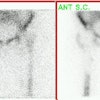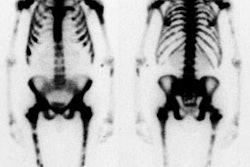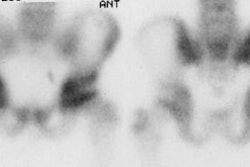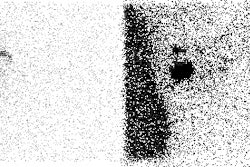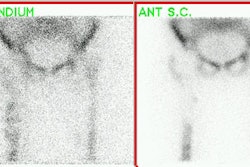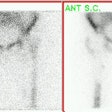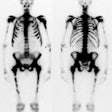AJR Am J Roentgenol 2001 Feb;176(2):407-11
Biopsy of sentinel lymph nodes guided by lymphoscintigraphic mapping in
patients with breast cancer.
Tuthill LL, Reynolds HE, Goulet RJ Jr.
OBJECTIVE. The purpose of this study was to determine the technical success rate
of sentinel node biopsy with lymphoscintigraphy in women with breast cancer and
the frequency with which sentinel node biopsy obviated axillary dissection.
Factors affecting the success rate of sentinel node biopsy and
lymphoscintigraphy were also evaluated. MATERIALS AND METHODS. Retrospective
review revealed 119 women with breast cancer who underwent lymphoscintigraphy
and sentinel node biopsy at our institution during the study period. A planned
axillary dissection was performed in 13 of the first 16 patients; otherwise,
axillary dissection was only performed if tumor was present in sentinel nodes or
if the sentinel node biopsy was unsuccessful. RESULTS. Sentinel node biopsy was
successful in 96% of patients, and sentinel node metastases were found in 20%.
In 78% of patients, a negative sentinel node biopsy obviated axillary
dissection. Prior excisional biopsy was not associated with a failed sentinel
node biopsy (p = 0.750) but was associated with failed lymphoscintigraphy (p =
0.01). Successful lymphoscintigraphy was associated with successful sentinel
node biopsy (p < 0.0001). No association was found between the histology or
size of the tumor and a failed sentinel node biopsy (p = 0.46 and p = 0.1,
respectively) or failed lymphoscintigraphy (p = 0.36 and p = 0.47,
respectively). CONCLUSION. Sentinel node biopsy guided by lymphoscintigraphy,
intraoperative gamma probe, and isosulfan blue dye is an effective alternative
to axillary dissection in patients with breast cancer. Lymphoscintigraphy
improved the success rate of sentinel node biopsy. Large tumor size or prior
excisional biopsy should not prevent patients from having sentinel node biopsy.
